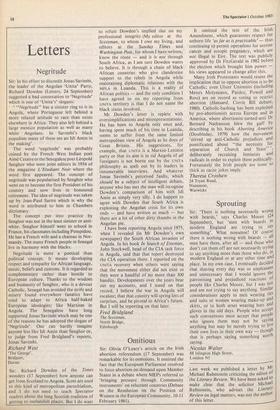Sir: Richard Dowden of the Times wonders (17 September) how
anyone can get from Scotland to Angola. Scots are used to this kind of metropolitan parochialism, and I do not need to teach Spectator readers about the long Scottish tradition of getting to outlandish places, But I do want to refute Dowden's implied slur on my professional integrity.1My editor at the Scotsman, to whom I owe my living, and editors at the Sunday Times and Washington Post, for whom I have written, know the route — and it is not through South Africa, as I am sure Dowden wants to believe. It is through a chain of black African countries who give clandestine support to the rebels in Angola while maintaining diplomatic relations with the MPLA in Luanda. This is a reality of African politics — and the only condition I have agreed to on my reporting from UNITA territory is that I do not name the black states involved.
Mr Dowden's letter is replete with oversimplifications and misrepresentations. He has been to Angola only once and, having spent much of his time in Luanda, seems to suffer from the same limited metropolitan view of Angola as he does of Great Britain. His suggestions, for example, that UNITA is a Marxist-Leninist party or that its aim is to rid Angola of all foreigners is not borne out by the UNITA philosophy as spelt out by its leaders in innumerable interviews. And whatever Jonas Savimbi's perceived ,faults, which should be a subject of intelligent debate, anyone who has met the man will recognise Dowden's comparison of him with Idi Amin as simply very silly. I do happen to agree with Dowden that South Africa is exploiting the Angolan crisis for its own ends — and have written as much — but there are a lot of other dirty thumbs in the Angolan pie.
I have been reporting Angola since 1975, when I revealed (in Mr Dowden's own newspaper) the South African invasion of Angola. In his book In Search of Enemies, John Stockwell, head of the CIA task force in Angola, said that that report destroyed the CIA operation there. I reported on the UNITA recovery when others were saying that the movement either did not exist or they were a handful of no more than 300 bandits. Developments over the years bear out my accounts, and I stand on that record. I believe the war in Angola will escalate; that that country will spring lots of surprises, and be pivotal to Africa's future. But I will be reporting on that later.
Fred Bridgland
The Scotsman, North Bridge, Edinburgh






































 Previous page
Previous page